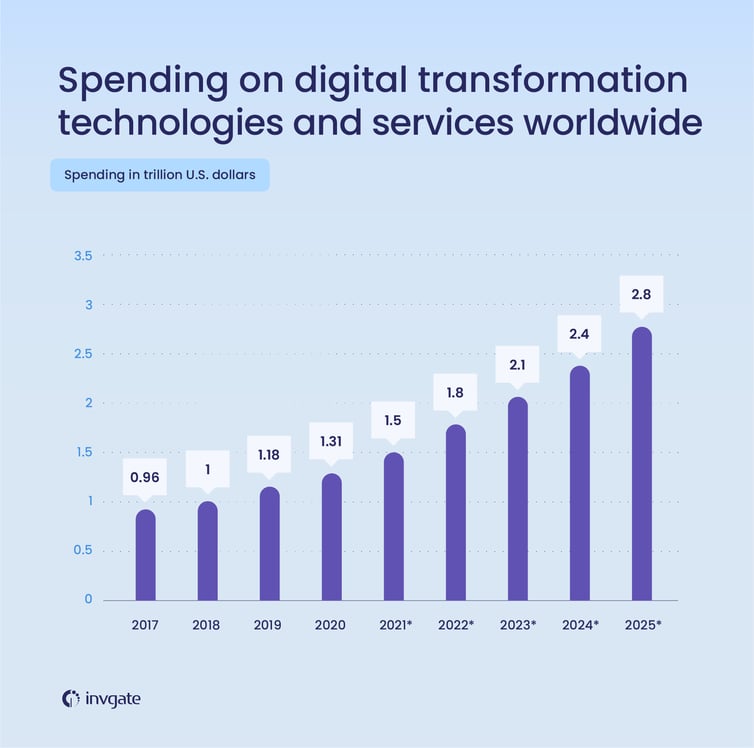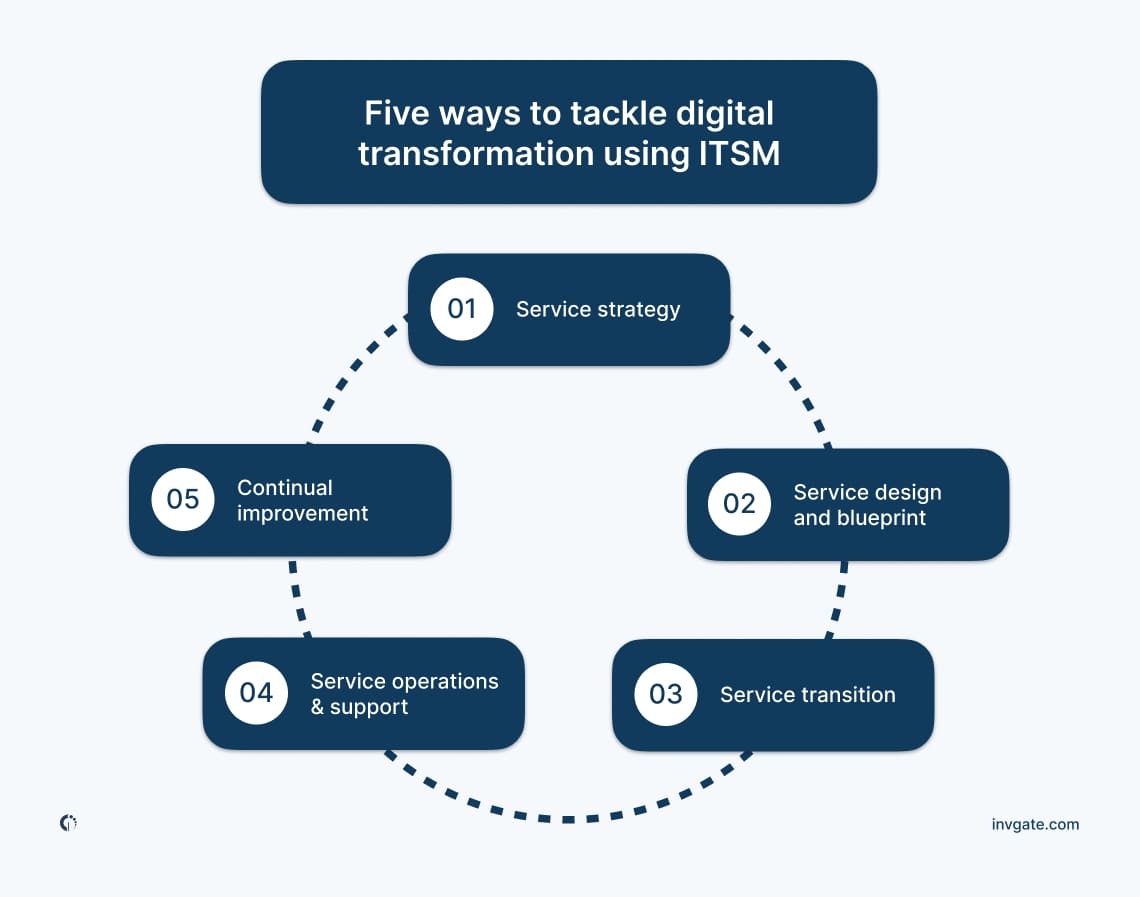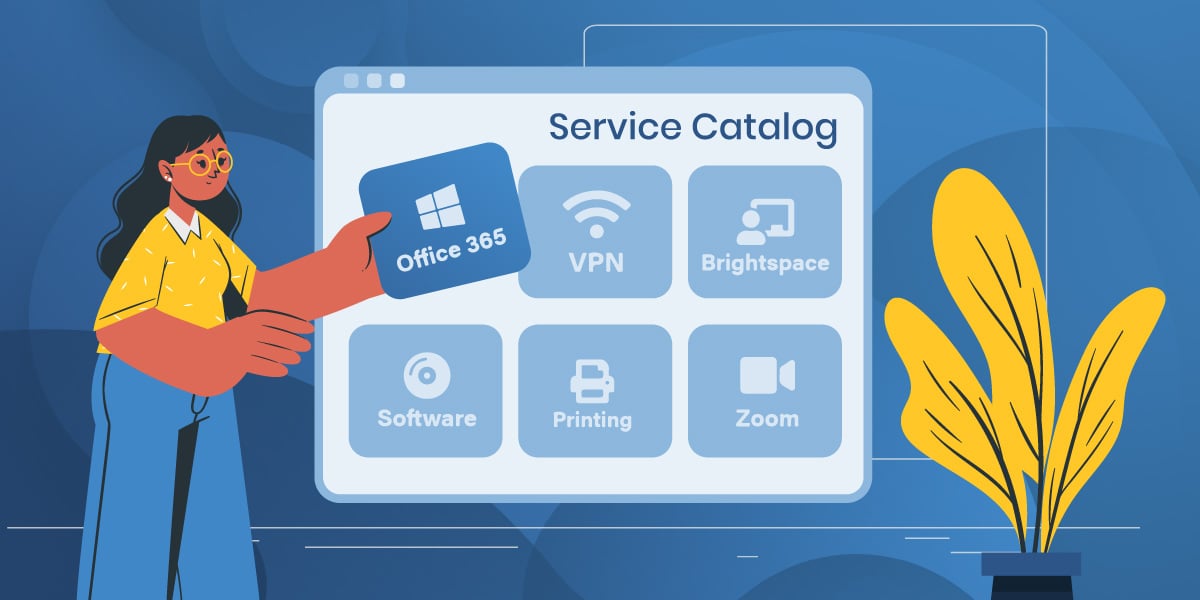IT Service Management (ITSM) is a fundamental piece in your digital transformation puzzle. In short, it provides a structured approach to managing digital services, ensuring they align with your organization’s digital transformation goals.
When embarking on such a journey, you will be leveraging different technologies to improve and optimize business processes, enhance customer experiences, and drive overall organizational efficiency.
To support this digital transformation, an ITSM strategy will help you design and maintain IT processes, services, and outcomes across your organization. Also, incorporating a robust ITSM tool will make your IT service delivery leaner and more effective, setting the scene for continuous improvement.
Are you ready to learn how ITSM can support your digital transformation efforts? Let's dive in.

What is the role of ITSM in digital transformation?
Digital transformation is not a small undertaking. The clue is in the name! It involves transforming your organization and its ways of working, replacing manual, paper-based tasks with new technology to deliver better outcomes to customers and stakeholders.
Of course, an initiative of that scale needs support. Between using new tools, implementing new technology, and satisfying customer needs at the same time, it’s important to ensure that this multi-layered process is executed in the right way. This is where ITSM comes into play.
A robust ITSM strategy is a must for your digital transformation initiative as it will guarantee the organization’s IT infrastructure is up and running and that technical difficulties are resolved effectively and on time. Also, it will make sure you are offering a great experience for users who are incorporating new digital tools and work processes.
Here are some of the main ways IT Service Management can help you on your digital transformation journey:
- By designing your IT services in a structured and organized way (in a service catalog, for instance) they will be available when needed, perform in line with business goals, and meet regulatory and legal requirements, ensuring that IT teams are held accountable for service delivery and that end-users get the help the.
- Along with the previous point, a solid IT support offering guarantees that any issues that come up can be easily reported on and fixed quickly without adversely impacting business operations.
- A Knowledge Management initiative provides your team with thorough resources and training to help them understand the new technology and ways of working. This can come in many forms, such as a central knowledge base with articles, how-to’s, and videos.
- Change Management/Enablement and Release Management practices in ITSM ensure that any new tools and services are transitioned effectively, efficiently, and safely. It provides a structured and efficient way to handle changes required to improve IT services, business operations and outcomes, and ultimately customer experience.
- Configuration Management to ensure the new services and any dependencies are understood, particularly in relation to links into legacy systems.
- The continual improvement practice will help your IT Management grow, evolve, and adapt. The digital scenario is constantly on the move, so it’s important to guarantee that your new ways of working will stay aligned with the new trends and business goals.
To help with this process, a service desk solution is a must-have. It provides a centralized platform for streamlining IT service delivery and automating processes, enabling organizations to adapt to evolving technology landscapes while optimizing operational efficiency. But more on this later, we promise.

Benefits of using ITSM to support digital transformation
To delve a little deeper into the topic, here are some of the key benefits leveraging ITSM practices and processes will bring to your digital transformation approach:
- Stronger operational efficiency - By streamlining and optimizing IT Management and automating routine tasks, you will reduce operational bottlenecks and improve overall efficiency.
- More accurate, repeatable processes - Standardized processes ensure consistency and accuracy in the delivery of IT services and a more reliable and predictable IT environment.
- Improved transparency - The practice provides visibility into IT processes, workflows, and service performance, enhancing transparency across the organization and fostering better decision-making.
- Better management of complexity - ITSM frameworks provide a structured approach to managing the complexity of IT environments. Through well-defined processes and documentation, this helps organizations navigate and control the complexities associated with digital transformation.
- Enhanced Customer Experience (CX) - ITSM's customer-centric approach aligns IT with customer needs and expectations. Also, improved incident resolution times and self-service options enhance the overall experience.
- Reduced costs - By identifying and addressing inefficiencies, the practice helps reduce operational costs and optimize your IT budget. On top of this, automation and standardized processes contribute to cost savings through increased productivity.

Five ways to tackle digital transformation using ITSM

In short, IT Service Management practices centralize and streamline IT service offerings, helping organizations navigate the complexities of modern technology landscapes and digital transformation journeys while keeping the customer at the center.
To help you with this initiative, the following five steps bring together key ITSM processes that will equip you to tackle digital transformation.
1. Service strategy
Service strategy is a group of ITSM practices that creates the overall approach for IT services. Its purpose is to “define the perspective, position, plans, and patterns that a service provider needs to be able to execute to meet an organization's business outcomes.”
Building a strategy can ensure that IT and the business work together to create a solid foundation and approach on which to design, build, and improve effective and efficient IT services.
Key practices for this stage include:
- Strategy Management for IT services provides a structured approach IT Management, ensuring that the goals and objectives of the digital transformation initiative align with those of the business.
- IT Financial Management is the practice that keeps your finances on track. It makes sure that the appropriate frameworks are in place for accounting for previous spending, budgeting for future expenditure, and ensuring costs are controlled throughout your initiative.
- Demand Management helps stakeholders understand the potential demand for new services and ensure that they fit the needs of the business. A key driver for this stage is understanding and mapping out patterns of business activity so that if an IT service or workflow is redesigned, it will be done in a way that ensures that it can meet the needs of the business.
- Service Portfolio Management is the practice that gives you a view of all services, including current, live services, planned services that exist in the pipeline, and retired services. By having a holistic view of services, integrations can be understood, and there is a reduced risk of duplication.
- Business Relationship Management is a key tenet of digital transformation, as is good communication, and this is the process that can help you establish and maintain strong relationships with the rest of the business.
2. Service design and blueprint
Service design ITSM processes are all about designing your IT service blueprint so that processes and deliverables are fit for purpose and for use. It takes the strategy defined previously and creates a structure that can transition it into business operations.
Service design practices that will support your digital environment will include:
- Availability Management ensures that services are available when needed and designed to meet current and future business needs.
- Capacity Management looks into the capacity of new services to guarantee they meet the agreed capacity and performance-related requirements, both current and future, in a cost-effective and timely manner.
- Information Security Management is needed to align IT security with corporate security and ensure that the integrity, confidentiality, and availability of company assets, information, data, and IT services always match the agreed needs of the business.
- IT Asset Management (ITAM) optimizes the usage of IT assets, equipment, and resources throughout their lifecycle, ensuring that they are functioning properly, in compliance, and optimizing costs.

- Service Level Management is the practice that ensures that all services deliver to agreed achievable targets, service provider, and customer requirements and that obligations are captured in Service Level Agreements (SLAs).
- Vendor Management ensures that the organization and third-party partners work together effectively and that all requirements and responsibilities are codified at a contractual level.
- Service Catalog Management acts as a single source of consistent information on all available technological services, helping users easily get access to them and their support information.

3. Service transition
The service transition processes are all about change. Their goal is to transition to new services, and update or retire those that are no longer needed effectively, efficiently, and safely.
The main transition processes that will help with your digital transformation efforts are:
- Release Management is the practice that delivers new hardware and software into the live environment and ensures the appropriate test and validation activities are carried out and that early life support for new services is in place.
- Change Enablement ensures that IT services are updated and maintained without disrupting business operations. It uses standardized methods, models, and templates to handle all the changes made in your digital ecosystem.
- Knowledge Management guarantees that all colleagues have the appropriate training, knowledge, and support in order to use new technology or services.

4. Service operations & support
Service operation and support processes are all about keeping the lights on. Their goal is to deliver and support existing IT services and to ensure that they continue to add value.
Key operational processes that will support digital transformation efforts include:
- The service desk is the single point of contact for IT so that any issues with your new digital service offerings can be dealt with quickly and effectively. AI-powered ITSM features and bots can be used to underpin it, automating support tasks and requests, making it easy and quick for customers to get the help they need, and freeing up technical colleagues to focus on more complex support tasks.
- Incident Management resolves any operational issues in your IT state. It ensures that any disruption to service is fixed as quickly as possible and with as little diverse business impact as possible.
- Event Management is the practice that proactively manages and supports your IT ecosystem by monitoring services and alerting the support team when preventative or remedial action needs to be taken.
- Problem Management looks to improve service quality over time by understanding the root cause of incidents and faults and identifying permanent resolutions. It is also the process that tracks known errors, so if a new service is introduced with defects, they are captured, and workarounds can be quickly identified and implemented.
5. Continual improvement
Last, but definitely not least, continual improvement is part of the service value ecosystem that improves service delivery and customer experience. This step guarantees that new products and services created by digital transformation initiatives continue to evolve and improve over time so that outcomes continue to meet the needs of the business and add value.
In an evolving scenario like the digital field, it’s very important to ensure that your IT service delivery doesn’t stay behind and remains updated with any new ways of work.
How InvGate Service Management can help with your digital transformation

As we mentioned, an ITSM solution is a core component in the process of implementing these practices to your digital transformation journey.
For this, InvGate Service Management provides an intuitive UX to manage IT support, which makes it a perfect fit for onboarding new users and ensuring effective adoption when embarking on your digital transformation process. Also, it is easily scalable to adapt both to your company's growth and changing needs along the process.
The tool also incorporates the following features to streamline your IT Management processes:
- A self service portal for users to smoothly submit their IT requests or issues and track them through their lifecycle, until resolution. They also have access to a centralized knowledge base to find information and solve the more simple requirements on their own.
- Automated workflows to ensure consistent and structured processes across diverse business functions, such as data entry and processing tasks. InvGate Service Management’s user-friendly graphical editor allows you to design workflows with drag-and-drop features, making it available to all users.
- Artificial Intelligence powered capabilities, such as AI Responses and Support Assist to further help your IT team by offering them recommendations, saving time and improving the quality of their work.
- Customized dashboards and reports for monitoring performance and facilitating data-driven decision-making and continuous improvement activities throughout the organization.
- If you are ready to take your digital transformation one step further, the platform can be smoothly expanded to other areas of your company, offering support for a more extensive Enterprise Service Management (ESM) approach.
This is just a sneak-peak of the tool’s capabilities; don’t hesitate to book a call with one of our experts, who can further assist you with your digital transformation needs and goals.
To sum up
Digital transformation is the process by which organizations embed technologies across their businesses to drive fundamental change and improve service delivery. Done well, it makes processes leaner and more effective, decreases duplication and human error, and improves customer outcomes.
ITSM can support this initiative by ensuring new services are transitioned safely into the organization, the correct support for knowledge retention and management is in place, and an effective support model underpins new services.
For this, an intuitive ITSM solution will help you streamline key activities and ensure user adoption. Check out InvGate Service Management’s 30 day free trial, and see for yourself how the tool can upgrade your digital efforts!















